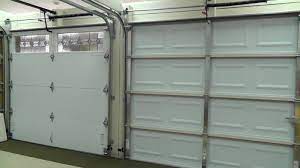Are you ready to unlock the secrets of garage door metal thickness and discover how it can impact the performance of your garage door? Picture this: the thickness of the metal is like the armor that shields your garage from the elements and potential intruders. But how thick is thick enough? And why does it matter? In this discussion, we will explore the different thickness options available for garage doors, uncover the benefits of heavy-duty and well-insulated doors, and reveal the reasons why you might need a thicker door. By the end, you’ll be equipped with the knowledge to make an informed decision about the thickness of your garage door metal. So, let’s dive in and unveil the secrets behind the strength and durability of garage door metal!
Normal Thickness Options for Garage Doors
When considering normal thickness options for garage doors, it is important to understand that they typically range from half an inch to 1 inch thick. The thickness of a garage door plays a significant role in its overall performance and durability. Garage door materials, such as steel or aluminum, can vary in thickness and impact resistance. Thicker doors tend to offer better insulation options, which can improve energy efficiency and reduce heat transfer from the external environment. Additionally, thicker doors are generally more durable and resistant to dents and damage. This is especially important in areas prone to severe weather conditions or high impact activities. By choosing a garage door with a suitable thickness, you can ensure that your door provides adequate protection, energy efficiency, and durability for your garage space.
Benefits of Heavy-Duty Garage Doors
Thicker, heavy-duty garage doors offer enhanced protection, durability, and energy efficiency compared to normal thickness options. These doors provide soundproofing options, impact resistance, energy savings, durability benefits, and insulation effectiveness.
Heavy-duty garage doors are designed to provide superior protection against external elements and potential damage. With double paneled doors, they offer increased impact resistance, reducing the risk of dents and damage. This durability ensures that your garage door will last longer and require fewer repairs or replacements.
In terms of energy efficiency, heavy-duty garage doors provide insulation that normal thickness doors lack. This insulation effectiveness helps to maintain a comfortable temperature inside the garage, reducing heat transfer from the home to the outdoors. As a result, you can enjoy energy savings and lower monthly expenses.
Furthermore, heavy-duty garage doors also offer soundproofing options, minimizing noise from the outside environment. This can be particularly beneficial if you use your garage as a workshop or recreational space.
Advantages of Well-Insulated Garage Doors
Well-insulated garage doors offer a multitude of advantages, including enhanced energy efficiency and temperature control. Here are four key benefits of well-insulated garage doors:
- Reduced energy costs: Well-insulated garage doors help to minimize heat transfer, keeping the temperature inside the garage stable. This reduces the need for heating or cooling, resulting in lower energy bills.
- Effective temperature control: With proper insulation, well-insulated garage doors help to maintain a comfortable temperature inside the garage. This is particularly important in extreme climates, where the garage may be used as a workspace or storage area.
- Noise reduction: Insulated garage doors can help to reduce noise transmission from outside, creating a quieter environment inside the garage. This can be beneficial if you live in a noisy neighborhood or if you use the garage for activities that require concentration.
- Increased durability: Well-insulated garage doors are typically more durable than their non-insulated counterparts. The added insulation helps to protect the door from dents and damage, increasing its lifespan and reducing the need for repairs or replacements.
Reasons for Needing a Thicker Door
If you are looking for reasons to invest in a thicker garage door, there are several factors to consider. One of the main reasons is energy efficiency. Thicker doors provide better insulation effectiveness, which helps to reduce heat transfer and maintain a comfortable temperature inside the garage. This is especially important in cold climates, where temperature fluctuations can be extreme. Thicker doors also offer increased durability, as they are more resistant to dents and damage. They provide enhanced protection against external pressure and can potentially lower monthly energy expenses by reducing the need for heating or cooling. So, if you live in a cold climate and want to improve the energy efficiency of your garage, investing in a thicker door is a smart choice. It will not only provide better insulation but also increase the overall durability of your garage door.
Considerations Beyond Thickness
When considering a garage door, it is important to take into account factors beyond just the thickness of the door. Here are some key considerations to keep in mind:
- Headspace measurement: Ensure that you have enough vertical space in your garage for the door to properly fit and operate. Thicker doors may require more headroom for installation.
- Double garages: If you have a double garage, you will need to consider wider doors to accommodate both vehicles. Customized dimensions may be necessary in this case.
- Standardized sizes: While there are standardized sizes available for garage doors, they may not always fit perfectly in every situation. Accurate measurements of your garage opening are crucial to ensure a proper fit.
- Manufacturing process: Understanding the manufacturing process of garage doors can help you make an informed decision. Steel doors are typically built from sheet metal that is cut and pressed into forms, creating different panel designs. Insulated doors have multiple layers with insulation in between.
Manufacturing Process of Steel Garage Doors
To better understand the manufacturing process of steel garage doors, it is important to delve into how these doors are built from sheet metal. Steel garage doors are constructed by cutting and pressing sheet metal into various forms, such as raised panels, long panels, or beadboard panels. Insulated garage doors typically consist of two or three layers, with insulation sandwiched between the steel layers. Different gauges of steel are used in the manufacturing process, with thicker steel being more durable and resistant to dents and dings. Thicker gauge steel also helps prevent warping from severe weather conditions. The thickness of the garage door is measured at its widest point, while the gauge refers to the measurement of the steel being used. Single layer garage doors, like the Amarr Lincoln LI1000, are the thinnest and made from a single sheet of 25 gauge steel. These doors lack insulation and have limited warranties, but they are popular due to their affordability. On the other hand, Amarr steel garage doors have an average thickness of 2 inches, while wood garage doors are 3 inches thick, and aluminum garage doors have a consistent thickness of 2 inches. The thickness of the garage door plays a significant role in its energy efficiency, with thicker doors providing better insulation and reducing heat transfer.
Importance of Steel Thickness in Garage Doors
Steel thickness is a critical factor to consider when evaluating the importance of garage doors. It directly affects the durability and performance of the door, as well as its ability to provide insulation and reduce noise. Here are four key reasons why steel thickness is important:
- Steel durability: Thicker gauge steel is more resistant to dents, dings, and warping caused by severe weather conditions. It enhances the overall lifespan of the garage door, making it a more durable investment.
- Garage door insulation: Thicker steel provides better insulation, helping to maintain a comfortable temperature inside the garage. It reduces heat transfer from the home to the outdoors, resulting in potential energy savings.
- Noise reduction factors: While steel thickness is not the main factor affecting noise reduction, it does play a role. Thicker steel, combined with proper insulation and construction layers, can help minimize noise levels, providing a quieter environment inside the garage.
- Comparison of steel thickness: Steel thickness is measured in gauge (ga) or gauge (mm). Lower gauge numbers indicate thicker steel. For example, 24 gauge steel is thicker than 25 gauge steel. Amarr recommends at least 25 gauge garage doors for two-car garages to prevent waviness over time.
Considering these factors, choosing a garage door with the appropriate steel thickness is essential for long-term durability, energy efficiency, and noise reduction.






